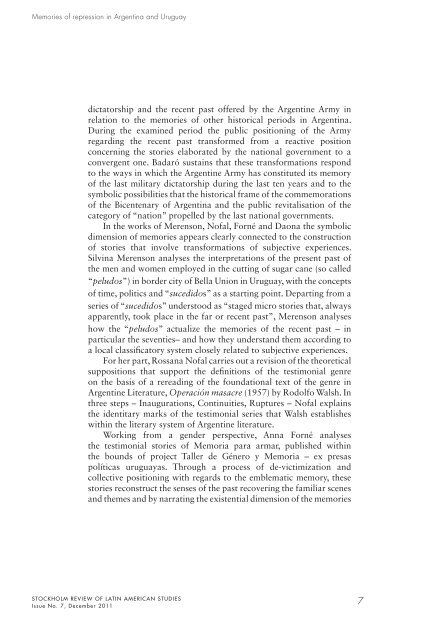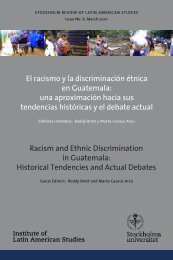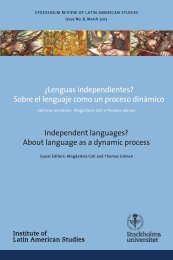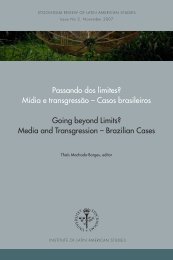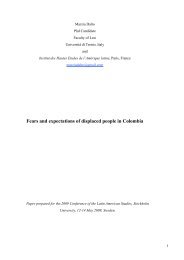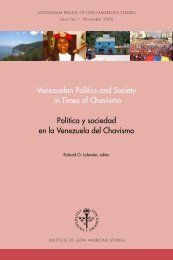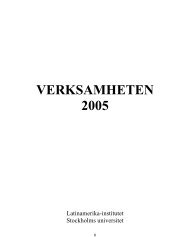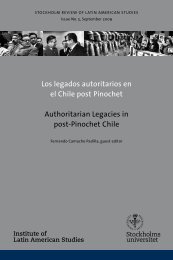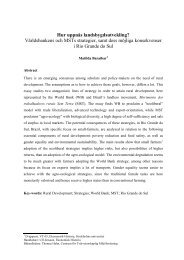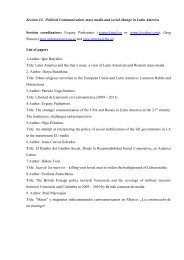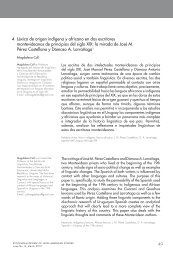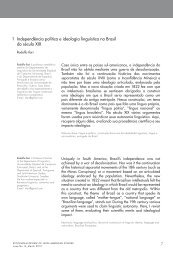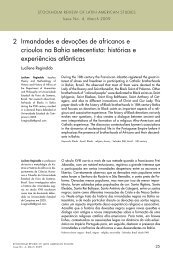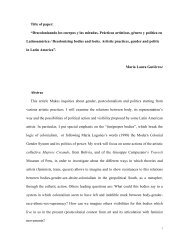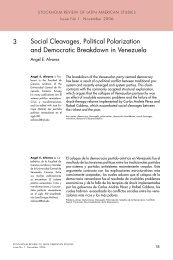Issue No. 7, December 2011 - Institute of Latin American Studies
Issue No. 7, December 2011 - Institute of Latin American Studies
Issue No. 7, December 2011 - Institute of Latin American Studies
You also want an ePaper? Increase the reach of your titles
YUMPU automatically turns print PDFs into web optimized ePapers that Google loves.
Memories <strong>of</strong> repression in Argentina and Uruguaydictatorship and the recent past <strong>of</strong>fered by the Argentine Army inrelation to the memories <strong>of</strong> other historical periods in Argentina.During the examined period the public positioning <strong>of</strong> the Armyregarding the recent past transformed from a reactive positionconcerning the stories elaborated by the national government to aconvergent one. Badaró sustains that these transformations respondto the ways in which the Argentine Army has constituted its memory<strong>of</strong> the last military dictatorship during the last ten years and to thesymbolic possibilities that the historical frame <strong>of</strong> the commemorations<strong>of</strong> the Bicentenary <strong>of</strong> Argentina and the public revitalisation <strong>of</strong> thecategory <strong>of</strong> “nation” propelled by the last national governments.In the works <strong>of</strong> Merenson, <strong>No</strong>fal, Forné and Daona the symbolicdimension <strong>of</strong> memories appears clearly connected to the construction<strong>of</strong> stories that involve transformations <strong>of</strong> subjective experiences.Silvina Merenson analyses the interpretations <strong>of</strong> the present past <strong>of</strong>the men and women employed in the cutting <strong>of</strong> sugar cane (so called“peludos”) in border city <strong>of</strong> Bella Union in Uruguay, with the concepts<strong>of</strong> time, politics and “sucedidos” as a starting point. Departing from aseries <strong>of</strong> “sucedidos” understood as “staged micro stories that, alwaysapparently, took place in the far or recent past”, Merenson analyseshow the “peludos” actualize the memories <strong>of</strong> the recent past – inparticular the seventies– and how they understand them according toa local classificatory system closely related to subjective experiences.For her part, Rossana <strong>No</strong>fal carries out a revision <strong>of</strong> the theoreticalsuppositions that support the definitions <strong>of</strong> the testimonial genreon the basis <strong>of</strong> a rereading <strong>of</strong> the foundational text <strong>of</strong> the genre inArgentine Literature, Operación masacre (1957) by Rodolfo Walsh. Inthree steps – Inaugurations, Continuities, Ruptures – <strong>No</strong>fal explainsthe identitary marks <strong>of</strong> the testimonial series that Walsh establisheswithin the literary system <strong>of</strong> Argentine literature.Working from a gender perspective, Anna Forné analysesthe testimonial stories <strong>of</strong> Memoria para armar, published withinthe bounds <strong>of</strong> project Taller de Género y Memoria – ex presaspolíticas uruguayas. Through a process <strong>of</strong> de-victimization andcollective positioning with regards to the emblematic memory, thesestories reconstruct the senses <strong>of</strong> the past recovering the familiar scenesand themes and by narrating the existential dimension <strong>of</strong> the memoriesSTOCKHOLM REVIEW OF LATIN AMERICAN STUDIES<strong>Issue</strong> <strong>No</strong>. 7, <strong>December</strong> <strong>2011</strong>7


